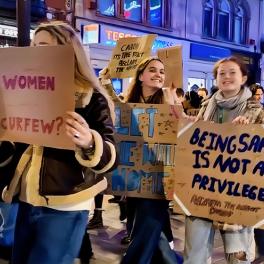
Please note: this article includes mature themes, including discussions of violence.
Lynn Perry MBE, Director Children's Services at Barnardo’s
Knife crime has risen at an alarming rate over the past few years - so it’s not
surprising that it always makes the headlines.
Although knife crime tends to be worse in big cities like London, it actually affects
all parts of the UK. According to the figures for England and Wales, there were
over 44,000 offences involving a knife or sharp instrument between June 2018
and June 2019. That’s a seven per cent increase on the previous 12 months.
This might sound frightening to you - not to mention your parents. But while the
statistics seem to tell a bleak story, all is not lost. Barnardo’s - the organisation I
work for - has tackled the toughest issues affecting children since they were
founded over 150 years ago. Knife crime is no different.
There’s no simple explanation for these statistics, no one reason for the increase
in knife crime, and no readymade solutions. But there are things we can do
together to address these risks and ensure young people like you - and the
communities you live in - stay safe.
Thinking about knife crime differently
To start, we have to think about knife crime differently.
The media sometimes paints a simplistic picture, where people are either brutal
‘perpetrators’ or unfortunate ‘victims’. But our experience tells us that many of the
people involved in knife crime have actually been through trauma early in their
lives.
Working with the whole family is the most effective way of helping people -
especially when adults are continuing to experience or be involved in violence.
We also need to stop stereotyping people. Those involved in knife crime don’t
exclusively come from a particular gender, age group, or ethnicity.
Knife crime is changing
In recent years, criminal exploitation has started to move into more rural areas. In
what the police call ‘county lines’ activity, organised gangs from big cities expand
their operations into smaller towns and cities to sell more drugs.
These gangs often exploit and coerce young people into carrying those drugs,
recruiting them through social media and promising rewards like fast food, gifts,
and money.
Once involved, it can be difficult to escape. Gangs sometimes trick young people
by arranging to mug them while they’re delivering a package, and then
demanding that they pay back the ‘debt’. This may lead to young people arming
themselves, often resulting in violence.
Young people want to feel safe
Many young people tell us that carrying a weapon is simply about feeling safe.
They fear that if they don’t have a knife, they may be attacked and - worryingly -
they don’t always feel that teachers, parents and other people in positions of
power have the means to tackle the issues.
The reality however is that young people who carry knives are more likely to be
targeted by people who want to hurt them - and more likely to be injured or even
die because of this.
What should society do next?
As a society, we need to go much further than simply stopping young people
from carrying knives. We must be working in a way that helps those already
affected to recover from the devastation of knife crime.
Barnardo’s has been working with a group of politicians in Westminster, looking
into the root causes of serious youth violence and how to tackle it.
Last year we brought together 16 young people from across the country who’d
been directly affected by knife crime. They came up with a 12-point manifesto
outlining what needs to be done, which they presented at 10 Downing Street.
They don’t want sticking plaster solutions like tougher sentences or increasing
stop and search powers for police. Instead, they want the underlying causes
tackled - like the lack of housing and unemployment - and for schools to better
support young people who are at risk of involvement in crime.
They also want the government to provide support to young people who are
already involved in, or at risk of, organised gang or county lines activity.
We think the new government should revisit their manifesto and treat knife crime
as a health and social issue, not just a criminal justice one.
There needs to be more investment in services that can help those already
involved in violence, as well as those who are most vulnerable and at risk. We
need to listen and respond to the children, young people, families and
communities affected by these issues.
And we need to work across all agencies including social care, health, police,
education and others - with and alongside local and national government - to
achieve the change we want to see.
Will's Response
Let's get this out of the way - I’ve never carried a knife, or even been threatened with one. I’ve led a comfortable life so far and never truly feared for my safety. But as someone who grew up in south east London and attended an underfunded and failing comprehensive, several of my formative years were periodically interrupted by gang scares and other potential attacks.
Someone would hear from someone that such-and-such a gang intended to shank one of the Year 11s for supposedly doing xyz, and pandemonium would break out. It might sound silly, but the threat was real enough to invite a protective police presence at the school gates as we ran to catch the bus. As if the prospect of ‘happy slapping’ wasn’t scary enough...
One time, I was accosted by a taller, older outsider at the bottom of the school field. He put his hand forcefully in between my legs and demanded my phone - which luckily, I wasn’t carrying at the time. Needless to say he didn’t need a knife to make my classmates cough up. We only plucked up the courage to call 999 when he was long gone. This was the kind of thing we worried about on a daily basis.
While I accept Lynn Perry’s point that knife crime affects all parts of the UK, these incidents - on top of the amnesty bins and the moralistic assemblies about peer pressure - always felt like a very London phenomenon. Or at least an urban one.
As an awkward, floppy-fringed teacher’s pet, I was (unsurprisingly) desperate to move schools. I didn’t want to be nervous when I walked down the corridors every day. I wanted to focus on learning stuff and getting good grades. So as soon as I reached 16, I started looking at other sixth forms and colleges. And what happened? One of the first open evenings was interrupted by a mass fight between rival groups - in which someone ended up being stabbed in the leg. Not the best first impression, to say the least.
I knew this place had a bad reputation. Like my own school, it wasn’t doing very well academically or financially. And like mine, people referred to this school’s students as a shorthand for dangerous or disruptive. But I'd wanted to give it a chance. ‘Bad’ schools often get worse because they’re labelled failures so they’re not seen as attractive prospects for investment. No one wants to go there unless they have to.
Reading Lynn’s piece, I’m so glad to hear that Barnardo’s are consulting young people on this issue - and hearing from them that stop-and-search and harsher punishments aren’t the answers. Lynn is right to say that it's not helpful to assume knife crime is a problem of specific socioeconomic groups - but she is also right to emphasise that unemployment, insufficient housing, and lack of youth services have an impact.
I agree, too, with her call to abandon the unhelpful victim/perpetrator binary, which still persists in media coverage (and many people’s heads). TV shows like Top Boy have shown that many knife-carriers are ordinary people who are drawn into carrying weapons for ‘protection’, or take part in gang activity because criminal transactions are woven into the financial fabric of the estate.
County lines activity proves that people across the UK are facing similar challenges - despite my feeling at school, it's not just Londoners. So, as Lynn says, it’ll take people from across the UK - and across different sectors - to change things.
More for you
Support Young Creators Like This One!
VoiceBox is a platform built to help young creators thrive. We believe that sharing thoughtful, high-quality content deserves pay even if your audience isn’t 100,000 strong.
But here's the thing: while you enjoy free content, our young contributors from all over the world are fairly compensated for their work. To keep this up, we need your help.
Will you join our community of supporters?
Your donation, no matter the size, makes a real difference. It allows us to:
- Compensate young creators for their work
- Maintain a safe, ad-free environment
- Continue providing high-quality, free content, including research reports and insights into youth issues
- Highlight youth voices and unique perspectives from cultures around the world
Your generosity fuels our mission! By supporting VoiceBox, you are directly supporting young people and showing that you value what they have to say.





